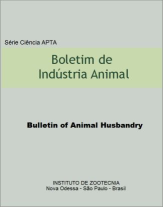Effect of lipid supplementation in lamb diets with macadamia oil cake on the dry matter intake and apparent fiber digestibility
Palavras-chave:
digestibility, lipids, ruminantsResumo
Lipids do not usually occur in large quantities in ruminant diets due to low concentrations found in forage and typical concentrated feed, like corn and soybean meal, which have values close to 3% dry matter (DM). Oils and fats are good sources of dietary energy found in greater quantity in some co-products. Therefore, there are limits on the use of lipids in ruminant diets due to negative effects on ruminal environment that lead to decrease in fiber digestibility. The objective of this study was to evaluate the effect of lipid supplied by increased concentration of macadamia co-product in lamb diets on DM intake and fiber digestibility. The trial used Dorper x Santa Inês lambs (n=31) with initial ages of about 90 days, kept in individual pens with feces and urine separators and collectors, fed diets (16% of crude protein (CP)) composed of 30% roughage (Cynodon sp.) and 70% concentrate (corn, soybean meal, macadamia co-product and mineral salt). Macadamia co-product had 9.86% CP and 60.45% ethereal stratum (EE). The animals were distributed according to weight in four treatments, with different levels of macadamia co-product in concentrate (0% 6.5%, 12% and 20%). The digestion trial was performed after 10 days adaptation, with 7 days of intake measurement, by weighing and sampling the offered food and orts, and after 5 days by complete collection of feces and urine. The data were analyzed by the SAS PROC MIXED logistic model, by linear regression. The concentrations of fat (EE) in the diets were 1.51%, 4.84%, 8.36% and 11.80%. There was a linear decrease in DM intake (3.612kg±0.3079, 3.549kg±0.370, 3.197kg±0.176 and 3.127kg±0.415, P<0.01 R2= 0.2842) without modifying FDN digestibility (P>0.05) with increased supplementation of macadamia co-product in lamb diets. As expected, the increase in available energy furnished by oil-rich macadamia co-product led to a chemostatic response of food intake depletion. This effect shows that lipid is a useful nutrient to increase energy density of finished lamb diets, without impairing fiber utilization. Although there was a decrease of DM intake, the ingestion of energy was compensated by the higher fat concentration of diets with increased proportion of macadamia co-product and can improve feed conversion. Macadamia co-product can be used for lamb finishing diets up to 12% inclusion in high concentrate diet.
Downloads
Downloads
Publicado
Edição
Seção
Licença
Os autores não serão remunerados pela publicação de trabalhos, pois devem abrir mão de seus direitos autorais em favor deste periódico. Por outro lado, os autores ficam autorizados a publicar seus artigos, simultaneamente, em repositórios da instituição de sua origem, desde que citada a fonte da publicação original seja Boletim de Indústria Animal. A revista se reserva o direito de efetuar, nos originais, alterações de ordem normativa, ortográfica e gramatical, com vistas a manter o padrão culto da língua e a credibilidade do veículo. Respeitará, no entanto, o estilo de escrever dos autores. Alterações, correções ou sugestões de ordem conceitual serão encaminhadas aos autores, quando necessário. Nesses casos, os artigos, depois de adequados, deverão ser submetidos a nova apreciação. As opiniões emitidas pelos autores dos artigos são de sua exclusiva responsabilidade. Todo o conteúdo deste periódico, exceto onde está identificado, está licenciado sob a Licença Creative Commons Attribution (CC-BY-NC). A condição BY implica que os licenciados podem copiar, distribuir, exibir e executar a obra e fazer trabalhos derivados com base em que só se dão o autor ou licenciante os créditos na forma especificada por estes. A cláusula NC significa que os licenciados podem copiar, distribuir, exibir e executar a obra e fazer trabalhos derivados com base apenas para fins não comerciais.













